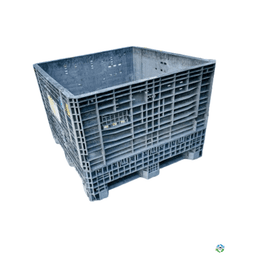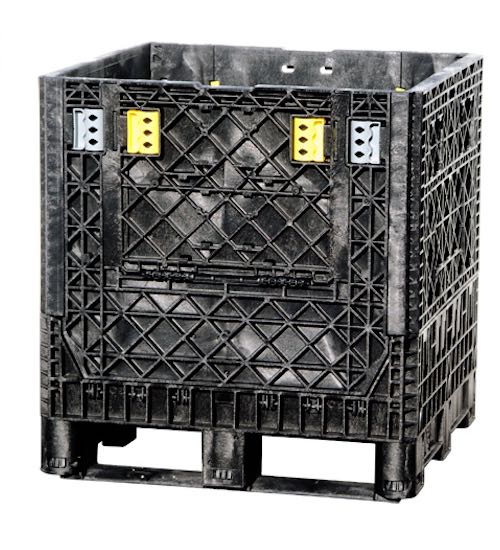Combining refurbished bulk containers and used collapsible containers for maximum storage use
The Ultimate Overview to Picking the Right Bulk Containers for Your Company Needs
Picking the proper mass containers is vital for any organization that counts on efficient logistics. Various sorts of containers exist, each made for specific materials and applications. Aspects such as size, material compatibility, and regulatory standards play a substantial role in this decision-making procedure. Understanding these components can lead to enhanced operational performance. Lots of businesses neglect vital facets that can enhance their overall efficiency and sustainability. What are these factors to consider?
Comprehending Various Sorts Of Mass Containers
Bulk containers work as crucial tools for organizations seeking effective storage space and transportation remedies. These containers come in numerous kinds, each made to meet particular operational requirements. One usual kind is the intermediate mass container (IBC), which is ideal for granulated and liquid materials, providing an equilibrium of ability and maneuverability. One more preferred option is the bulk bag, or FIBC, ideal for completely dry, flowable items. These adaptable containers are light-weight and can be conveniently moved and stored. For much heavier products, stiff bulk containers are often used, giving durability and security for secure handling. In addition, there are specialized containers tailored for dangerous products, making certain conformity with safety and security laws. Understanding the distinct qualities of these bulk container types permits organizations to make enlightened decisions that optimize logistics and reduce prices. By picking the right container, companies can enhance their operational efficiency and simplify their supply chain processes.
Secret Material Factors To Consider for Bulk Containers
When selecting bulk containers, it is necessary to ponder the products utilized in their building and construction. Elements such as chemical, toughness, and durability compatibility play a critical role in ensuring the containers satisfy certain operational needs. In addition, weight and portability worries can impact both performance and transport logistics.
Product Sturdiness and Strength
Toughness and toughness are critical aspects in selecting products for bulk containers, as they straight affect the container's capacity to hold up against various environmental problems and dealing with procedures. Materials such as high-density polyethylene (HDPE), polypropylene, and stainless steel are frequently favored for their robust buildings, offering resistance to abrasion, temperature, and effect fluctuations. The selection of product also affects the overall life expectancy of the container; more powerful materials commonly cause much less frequent replacements, bring about set you back savings gradually. Additionally, the weight of the product can impact delivery expenses and convenience of handling. Services have to consider their particular operational atmospheres and the potential for wear and tear to ensure peak longevity and toughness in their bulk container choice.
Chemical Compatibility Elements
Understanding chemical compatibility is important for selecting bulk containers, as the materials used should resist the particular substances they will hold. Various variables influence compatibility, consisting of the chemical nature of the contents, temperature level, and duration of storage space. Harsh chemicals may need containers made from stainless steel or specialized plastics that withstand deterioration. Furthermore, responsive compounds can generate heat or gases, demanding aired vent or pressure-rated containers. The choice of container product, whether polycarbonate, polyethylene, or steel, need to straighten with the chemical homes of the kept substances to avoid leakages or violations. Ultimately, a comprehensive evaluation of these compatibility aspects guarantees secure handling and storage, safeguarding both workers and the environment while maintaining product stability.
Weight and Portability Worries
Picking mass containers includes not only reviewing chemical compatibility but also considering weight and portability. Services have to evaluate the convenience of handling and transportation to optimize efficiency. Lightweight materials like high-density polyethylene (HDPE) or aluminum can assist in much easier motion and reduce delivery costs. Alternatively, heavier containers might give improved sturdiness but can prevent movement, particularly in atmospheres needing regular relocation. In addition, the layout of the container must enable for convenient lifting and stacking, making certain ergonomic safety for workers. Business must likewise take into consideration the facilities offered for transportation; as an example, containers compatible with forklifts or pallet jacks can enhance operations. Eventually, the ideal balance in between weight and portability directly influences functional efficiency and cost efficiency.
Sizing Your Bulk Containers for Optimum Efficiency
When sizing mass containers, services have to thoroughly assess the dimensions needed to accommodate their specific items. In addition, weight capacity is a critical factor that affects efficiency and security throughout transport and storage. Effective sizing not just takes full advantage of room but likewise maximizes operational operations.
Identifying Container Capacities
Picking the ideal measurements for mass containers is essential for making the most of effectiveness in storage space and transport. Services should analyze their particular needs, thinking about variables such as readily available space, the nature of the goods being stored, and the approaches of transport used. Accurate dimensions assure that containers fit preferably in cars and storage facilities, lessening lost space and decreasing handling time. Criterion dimensions can provide benefit, but personalized measurements may be essential for unique demands look at this web-site or to suit particular items. Furthermore, it is very important to review piling capabilities and availability, as these variables affect overall functional performance. Ultimately, the ideal dimensions result in improved organization and streamlined logistics, profiting the overall efficiency of the business.
Weight Ability Considerations
Understanding weight capacity is important for organizations aiming to optimize their bulk container efficiency. The weight capacity of a container straight influences storage capacities, transportation logistics, and overall functional costs. Selecting containers with the suitable weight restrictions ensures that organizations can securely keep and move their items without running the risk of damages or conformity problems. Overwhelming containers can bring about structural failures, while underutilizing capacity cause lost sources. When selecting containers, it is important for organizations to assess their item weights and take into consideration any kind of regulatory demands. In addition, factors such as the sort of material, intended use, and environmental conditions need to additionally influence weight ability decisions. By evaluating these aspects, services can improve effectiveness and assure a structured supply chain.
Governing Compliance and Security Standards

Regulatory compliance and safety and security criteria play a crucial function in the option of mass containers for businesses. Organizations should guarantee that their containers fulfill numerous policies set by local, nationwide, and worldwide authorities. These requirements usually refer to material safety and security, architectural honesty, and proper labeling, which assist prevent accidents and ensure the secure transportation of goods.
Furthermore, adherence to industry-specific guidelines, such as those from the Food and Medicine Administration (FDA) or the Occupational Safety And Security and Health Management (OSHA), is essential for firms handling harmful materials or food. Non-compliance can lead to fines, lawful issues, or damages to an organization's online reputation.
Businesses must also take into consideration the container's compatibility with the materials being kept or moved to prevent contamination or chemical reactions (used collapsible bulk containers). To summarize, comprehending and carrying out governing conformity and safety and security requirements is important for the accountable and reliable usage of mass containers
Sustainability Alternatives for Eco-Friendly Mass Containers

Firms are likewise discovering options made from recycled products, which not only conserve resources yet additionally sustain important source the recycling market. In addition, innovations in design enable for lighter containers that call for less energy to transport, further enhancing sustainability. By incorporating these environmentally friendly mass container choices, companies can demonstrate their dedication to ecological stewardship while meeting consumer need for lasting methods. This shift not just aids the planet however can also improve brand track record and consumer loyalty.
Cost-Effectiveness and Budgeting for Mass Containers
While many services concentrate on sustainability, cost-effectiveness stays a vital aspect when picking bulk containers. Organizations needs to evaluate the preliminary purchase price, along with long-term operational expenses, to ensure economic viability. Factors such as upkeep, reusability, and toughness play a significant role in identifying total costs.
Purchasing high-grade containers might yield higher upfront prices however can cause financial savings with decreased substitute rates and lowered waste. In addition, businesses ought to take into consideration transport prices and storage performance, as these can influence the total spending plan.

Frequently Asked Questions
Exactly how Do I Determine the Right Container for Hazardous Products?
To determine the ideal container for harmful get redirected here materials, one must assess compatibility with the substance, take into consideration the container's material, check for governing conformity, and assess capability and security functions to guarantee correct handling and storage space.
Can Mass Containers Be Personalized for Specific Products?
Yes, bulk containers can be customized for certain products. refurbished bulk containers. Various functions, such as layout, size, and material, can be customized to fulfill special requirements, making certain excellent security and performance for delivering and keeping various goods
What Is the Average Life Expectancy of Different Bulk Container Types?
The ordinary life-span of mass container kinds varies; plastic containers last 5-10 years, metal containers 10-20 years, and wood containers normally last 3-7 years, relying on usage, maintenance, and ecological conditions.
How Should I Tidy and Maintain Mass Containers?
To clean up and maintain bulk containers, one need to regularly check for damages, eliminate residue, wash with appropriate cleaning agents, wash completely, and warranty correct drying out prior to storage space. Complying with supplier standards improves durability and security during use.
Are There Rental Options for Mass Containers Available?
Yes, many firms provide rental alternatives for mass containers, giving versatility for services. These leasings can fit different demands, enabling firms to take care of inventory effectively without the commitment of purchasing containers outright.
Durability and toughness are crucial aspects in choosing materials for mass containers, as they straight affect the container's capability to withstand various ecological conditions and taking care of processes. Understanding chemical compatibility is crucial for choosing mass containers, as the products utilized should resist the particular substances they will hold. Understanding weight ability is essential for organizations aiming to optimize their mass container effectiveness. Regulative compliance and safety requirements play an essential role in the choice of bulk containers for organizations. While several organizations concentrate on sustainability, cost-effectiveness continues to be a vital element when picking mass containers.